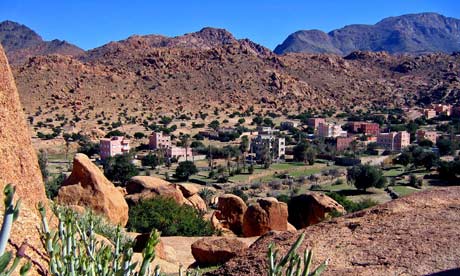
During the eight years that I've lived in Casablanca, I have searched for a secluded scrap of paradise to escape the wild rumpus of the city. The other day I finally found it.
Drive south-east from Agadir, through fields planted with veg destined for Tesco stores half a world away, and you eventually spy a little track on the right. Blink and you'd miss it. To take it is to ride the grand slalom of Morocco's south, a piste so windy that you wonder if it's a secret vehicle test track. Veering left, then right, the route doubles back on itself and narrows alarmingly, with boulders the size of mansions looming down either side.
There are no road signs, and the only people are shepherds, cloaked in chill shadows between the rocks. Their goats don't bother scrounging for scrub and grass. They're up in the trees, feasting on argan nuts instead.
A moment before you throw it all in, swing a U-turn and head for home, you catch a first glimpse of it – Tafraoute. Cupped in a shallow bowl between rocky outcrops, it has something serene about it, a perfect balance uniting nature and man. A cluster of slender minarets and low pink homes, there's a sense that it has just that moment been conjured by a good jinni, like something from the pages of One Thousand and One Nights.
This is Morocco's Berber heartland, where proud tribes, traditions and folklore pre-date the Arab conquest by centuries, a realm set quite apart from the hubbub of the kingdom's big cities and ubiquitous urban sprawl.
An ancient oasis, Tafraoute was first discovered in the 60s by the flower power generation, when droves of tie-dyed hippies trundled south in their combi vans.
These days, it's patronised by the world's leading rock climbers, lured by the sleek, wind-sculpted faces of sheer granite, set against a backdrop of utter tranquillity.
I stayed at Hotel Salama on the edge of the main square. Nestled all around are little shops and stalls. At one, I found lumps of rock crystal, and sulphur, dried chameleons, cactus roots and myrrh, for use in spells. Another stall, opposite, was touting a selection of antique angular iron keys, once used in the region's famous wooden locks.
But, best of all, was the shop selling ordinary objects made from old paint cans, glass jars and discarded plastic. I bought some lanterns there, a paint can bucket, and a shopping basket made from crocheted plastic bags.
The most wonderful thing about Tafraoute is the way people are genuinely pleased to see a visitor and, equally, how they don't hassle you as they do elsewhere.
Having fallen in love with a little Berber chest, I had to beg the shopkeeper to sell it to me. He insisted I could get a better one round the corner for half the price.
The greatest treasure of all lies on a little lane in the backstreets of Tafraoute. It's called Chez Sabir, and it is the ancestral home of Abdel-Latif Bakrim, a culinary genius and a man so gentle that you wonder how he manages to run a business at all. There are just three tables, laid out in the family's sitting room, with a small kitchen behind.
As anyone who lives in Morocco well knows, the national cuisine is at its best not in a restaurant, but in the home. And Chez Sabir is a home.
Comprising of thick harira soup, Moroccan salads, and lamb cooked with prunes, the meal surpassed my wildest expectations. Before leaving, I asked Abdel-Latif for his secret. Smiling very broadly, he narrowed his eyes, and said: "Good food is made all the more delicious by the arrival of a guest."
• Hotel Salama (+212 28 800026 hotelsalama.com) has doubles from around €25, breakfast €2. Chez Sabir, 41 Route Ammeln, +212 6 66 419968
Tahir Shah's new novel, Timbuctoo, will be published in June by Secretum Mundi Publishing at £29.99

